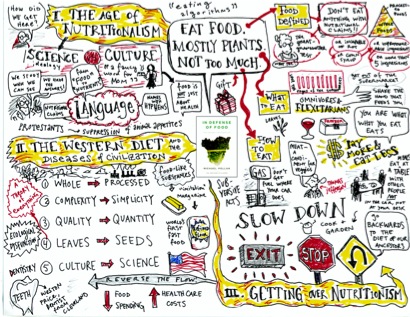How We "Managed" To Screw It Up

This entry might turn into a bit of a rant.
My question, How did we manage to f@#^ up our age-of-Aquarius opportunity in the world? When I look around, I notice that, not only is my generation worse off than the prior one, it's worse off than the one before that! The next generation seems to be even worse off than mine was. How did we manage to do that?
I just finished reading Michael Pollan's In Defense of Food, which continues his commentary, started in The Omnivore's Dilemma, on the sorry state of food production and distribution. He cites the close correlation between the introduction of what he calls Nutritionism and increases in everything from heart disease to attention deficit syndrome. Pollan speaks at length about the curious science of nutrition, which he claims more closely resembles a religion than a disciplined science. Post WWII, food became increasingly replaced by nutrition, typically vitamins and minerals added to a corn starch base and sold in lieu of food. This strategy enables industrial food producers to enjoy huge margins, but it ignored something important about food. Food apparently cannot be successfully separated from its context. We can't just distill a meal into a prescribed set of nutritional elements and expect to thrive. a) We don't yet understand what all the elements are and how they actually relate, and b) We have been misusing science to support the notion that we DO know what we actually do not. (Oh, and successfully lobbying to make this speculation the law of the land.)
... We have apparently been following a similar path in other areas, too. What Pollan noticed in the food system is at work in other areas of our society as well. His description of the Industrial Food System and the emerging Industrial ORGANIC Food System can pass for a reasonable description of our Managed Health Care system, too, and our Homeland Security System, as well as our business management system. What do these systems have in common?Managers!
Not, as my daughter used to explain when she came home from grade school, "Self Managers," but what might be best described as "Other Managers." People who's primary job is to manage the interactions of others.
Who am I pointing my finger at? An old friend once confided an old bit of Brazilian folk wisdom: If it smells like dog shit where ever you go, check your own shoes first." Full disclosure: I have a degree in management. It seems as though I've been trying to unlearn ever since what I learned to earn my degree.
Okay, this IS turning into a rant. Perhaps a rant aimed at myself, but a rant nonetheless.
Peter Drucker claimed that the rise of the professional manager was the most significant achievement of the 20th century. I'm thinking that the replacement of the professional manager by the rise of the self manager might be the most significant achievement of this new century. If we can pull it off.
The professional manager is informed by a body of knowledge referred to as "management science," but like Pollan's description of nutritionism, management science is a curious kind of science, indeed. Based, as Stafford Beer noted a generation ago, more on authority, a priority, and tenacious belief than replicable science, and much more reductionist than holistic in perspective. My management training did little more than indoctrinate me into a way of thinking that separated me from some of my more important human capabilities, inducting me into a social class bred to be nourished by self sacrifice and rewarded according to my ability to encourage others to sacrifice themselves, too. For this effort, I was paid more than the rank and file.
Pollin labels nutrition science "nutritionism" because it became science in service not to nutrition or to humanity, but to short-term competitive advantage. Why would anyone create Wonder "helps build strong bodies twelve ways" Bread when the bread everyone was already eating built stronger bodies in innumerably more ways? Because if you take all of the complexity out of flour and replace some of it with simple, artificial ingredients, it won't spoil AND the producer can realize the mammon of all mammon, economy of scale! Big success.
In the same way that nutritionism misused nutritional science, manage-ism misuses science, employing it primarily as justification for what the machine already intended to do anyway. What's the primary problem with project management? Managers. Why does Scott Adams continually poke at the PM as the lowliest life form? People do not like to be managed. They are perfectly capable of managing themselves. But we've lost that knowledge somewhere. Somehow.
In conversation with an engineering manager recently, he was recounting how, early in his career, he would hop on a plane without any authorization, and fly to corporate headquarters to chat with the CEO. He noticed in that conversation that he had never done anything that outrageous or productive in his current job, that he'd "shut down" here. I asked him when he'd shut down, and he responded "nine years ago, about a week after I started working here." There, where management managed everything, creating a permission-focused culture where otherwise sentient adults ask their managers permission before doing anything.
In the next installment, I'll tell the story of a doctor who decided to go "off the grid" and stop accepting insurance claims as reimbursement for his services. His break-even patient load fell from 3,000 to under a hundred. His office staff went from 3/4 dedicated to billing and collection to two, with no one doing any accounting of any kind. His story describes how taking the manager out of managed care resulted in ... ahem ... more care.
Huff Puff.


